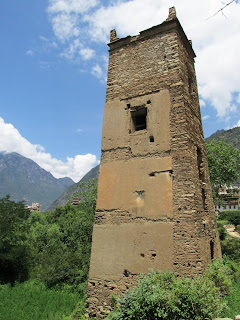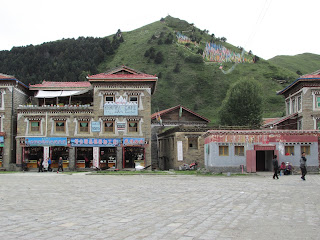When
the driver stopped in Danba, I asked where the guesthouse is. He pointed across
the river. I figured I could walk that far; so off I went. When I didn’t see
the guesthouse after an appropriate time, I asked someone else, showing the
address in Chinese. He pointed ahead to the end of the street. Off I went. Once
I got there, I didn’t see anything that looked like a guesthouse; so I asked
again and the man pointed down and around the corner. Since everyone pointed
like it was close, I kept going for twenty-five minutes. At that time, I asked
two women who pointed ahead and clearly were telling me it was too far. They
got a taxi for me and told the driver where to take me. The guesthouse was
still a five-minute drive away. I wondered why the first driver hadn’t told me
to take a taxi or hadn’t told me how much he’d charge to drive me. I would have
happily paid, since I had no idea where I was going.
A nice
surprise when I arrived at the guesthouse was that there is an English-speaking
student who had arrived on Saturday for his summer job there. His English isn’t
great, but is certainly was good enough to communicate with me.
On the
way, I had been thinking about eating, as I finally had an appetite again. I
realized that there are very few Chinese foods that I could consider to be comfort
foods. Luckily the young man was able to make the only dish I wanted—tomato and
eggs. And he delivered it to my room. Then he plopped on the bed to chat, which
I was not happy about, as I was tired and needed to eat. Fortunately, he left
after several minutes.
After
resting for a few hours, I headed out to buy my bus ticket to Chengdu on
Tuesday. I had thought that the hostel is near the bus station, but I was
wrong. The hostel woman said they would help me on Monday, but I explained that
I’m American and we like to do things early and I needed a ticket on Tuesday.
So the young man took me to the bus station and we purchased a ticket. I always
feel better knowing that I have a ticket.
Then it
was back to my room to rest some more. A couple hours later I went out to buy
some food and walk a bit. I was happy to be able to walk without stopping every
ten steps but couldn’t walk long. I found a supermarket where I purchased
calories, some of which also have nutrition. Then I stopped at reception to ask
about arranging a driver on Monday to take me around the area. After making the
arrangement, I was happy to be able to give the young man a genuine smile—at
least one that felt genuine from the inside. Returning to my fourth floor room,
I was really happy to have to stop only once on the way. Progress. The lower
altitude, 6200 feet, was really having an effect.
Monday
morning when I went to the reception area, no one was there to help me get a
driver. After twenty minutes, I went upstairs to find the young man. He didn’t
seem to remember that we had made the arrangement on Sunday, which is so
Chinese. But he returned with me and told the woman that I wanted a driver.
When the man arrived, we arranged to go to four places—two villages and two
scenic places that were on a sign I’d seen. When we were getting ready to
leave, the young man rather enthusiastically asked if it would be OK with me if
he went along. Of course. It was nice of the manager to send him with me to
assist with communication.
First
we took a rugged road part way up a mountain. Then the driver stopped and
instructed us to walk, which we did. I hadn’t anticipated walking up a mountain
that day; I thought we were going to a village to walk around. But up we
went—slowly. I was glad I could walk uphill more easily now that I was at a
lower altitude. This was a rocky path, and Tang was very mindful of how I was
doing.
After half an hour, we reached the place with a magnificent view of the
valley and Zhonglu village across the way. Zhonglu is another of the three
villages famous for the watchtowers, and we could see them scattered around the
area.
After enjoying the view and taking photos, we headed onward to the
meeting point with the driver, who was waiting for us at some sort of
government building. After walking for a while, Tang mentioned that the driver
had said twenty minutes. I said the driver was wrong. Some of our slower time
was due to my slow pace, but some wasn’t. He wouldn’t have arrived where we
were in twenty minutes even without me. We continued onward and downward,
enjoying the landscape and the views.
When we came to a house, Tang asked for
directions to the government building, and we followed them. At some point, it
became clear that we had taken a wrong path somewhere, and he was concerned
that he didn’t know where we were. Whenever we found a person, he asked for
directions. We walked past many stone houses—some old and some new. Eventually,
we came to a construction site for a middle school. At the intersection, we
followed a man’s directions until the road clearly went to two houses and
stopped. Then we headed back up, and Tang called the driver to meet us at the
middle school. When we met him, we realized that the man had sent us the wrong
way. The middle school isn’t far from where we had started the walk uphill. In
the end, we walked for two hours—not twenty minutes. We never did find out
where the original meeting point was. Tang was apologetic for his mistake, but
I told him not to worry because I had enjoyed the walk. And I had. It was a
beautiful walk. He was very solicitous of me the whole time, taking my hand
when the path was rugged, and holding my arm to help me to uphill.
On the
way down the mountain, we stopped at the viewpoint for photos. I had been
thinking that I’d like to walk through the village a little, but by that time I
was finished and tired. I’d seen a number of houses and some watchtowers, and
walking through the village wouldn’t be much different—just more of the same in
a concentrated area and no mountain path.
Next we
went to Suopo, the third of the Tibetan villages in the area. The road there
was also rugged. My body was getting tired of the shaking and rattling. When we
stopped, a man led us up the mountain to his watchtower. I hadn’t thought we’d
be doing more uphill walking, but there we were and up we went. The trees along
the path are about 400 years old. One is 1000 years old.
When we reached the
watchtower, the man said we had to pay 20 RMB/$3.30 to go inside, which was not
a surprise. I’d expected that he wanted money. But, since we were there, we
might as well go inside. He explained that his watchtower is one of the oldest
in the area—850 years old.
The house was the house of the local king. One room
is a painted altar room. We went up ladders inside the house to the top where
the tower is. There is another tower nearby that we could have gone to, but one
was adequate.
The towers have different shapes—some have four sides,
some have
eight. They were used during war to warn of enemies approaching.
When we walked
down, men were carrying loads of dirt to the path. One man told Tang that the
path would be easier to walk on the next day. I’m not sure why we stopped at
this man’s house. Perhaps he is a friend or relative of the driver.
So that
was my visit to Suopo. In the end, I visited all three of the Danba Tibetan
villages and didn’t go into any of them, which I found interesting. I know you
can pay admission and walk around the villages, but that didn’t happen. I’m
happy with what did happen.
Next we
headed to the Manoiu Valley, which was on the sign I’d seen. Another rugged
road, but this one goes along the river. It’s a lovely drive.
The destination
was the narrow canyon through which the river rushes loudly and rapidly.
On the
way back, we stopped to photograph a tree the driver likes.
The evening light
on the water was lovely.
That
was our last destination. There wasn’t time for the fourth one, which was fine
with me. My body was tired of being shaken and rattled so much, and I was ready
to return to my room. After a brief rest, I went downstairs to eat dinner. Tang
suggested that I go out. When I asked if he was cooking, he said the woman was
cooking noodles. That sounded good to me, as I really didn’t want to go out.
The noodle soup was some of the most delicious I’ve had. She wouldn’t let me
pay for my small bowl of soup. Perfect after the long day.
The day
worked out well. Tang was a good companion and support when I needed it—and
sometimes when I didn’t—and he spoke English well enough and got lots of
practice to build his confidence. I know my trip would have been different if
he hadn’t been along—maybe I would have been taken to walk in the villages
instead of on the mountains. And, if I hadn’t been there, he wouldn’t have had
the trip to see some of the sites in the area. So it worked out well for both
of us.

























































